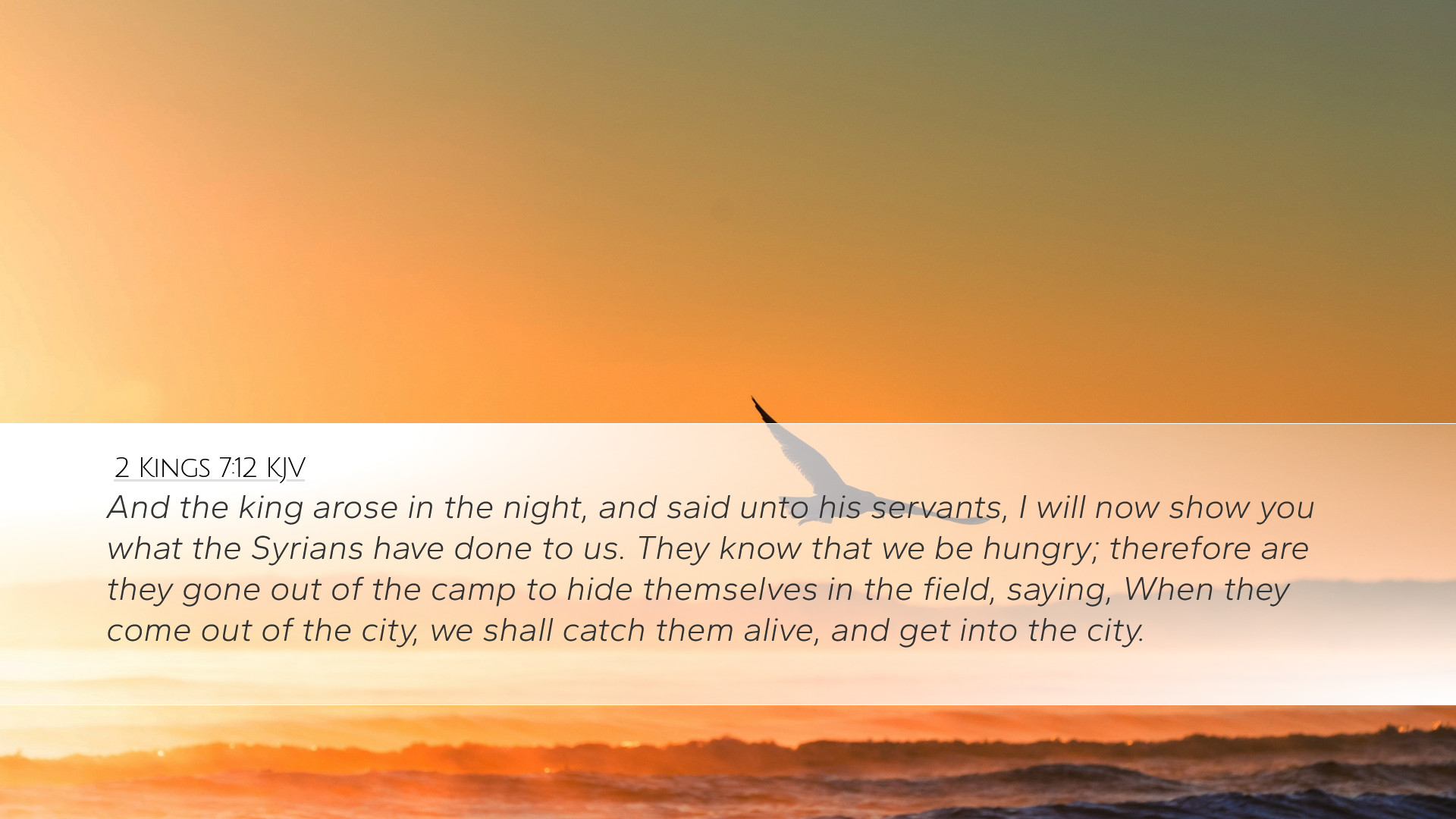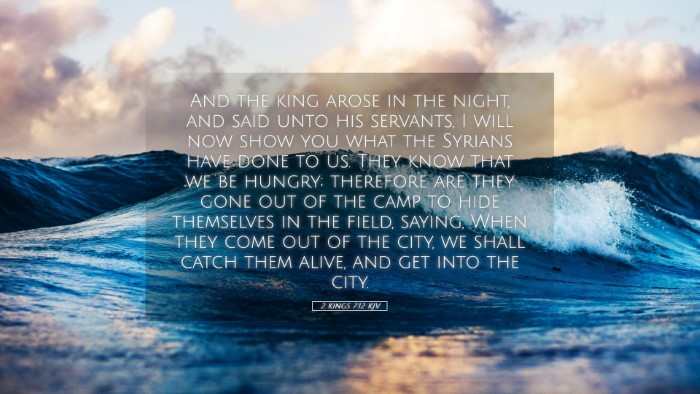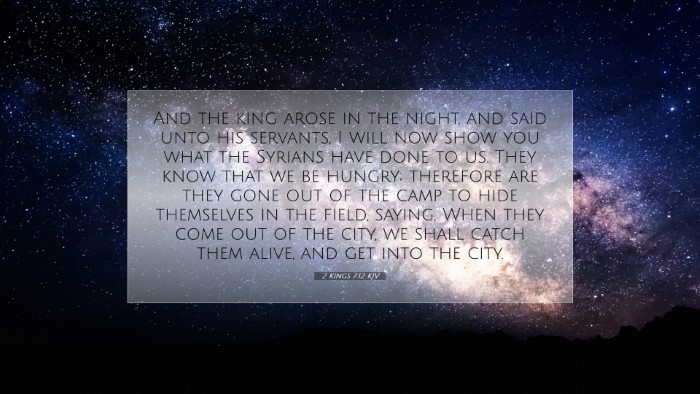Old Testament
Genesis Exodus Leviticus Numbers Deuteronomy Joshua Judges Ruth 1 Samuel 2 Samuel 1 Kings 2 Kings 1 Chronicles 2 Chronicles Ezra Nehemiah Esther Job Psalms Proverbs Ecclesiastes Song of Solomon Isaiah Jeremiah Lamentations Ezekiel Daniel Hosea Joel Amos Obadiah Jonah Micah Nahum Habakkuk Zephaniah Haggai Zechariah Malachi2 Kings 7:12
2 Kings 7:12 KJV
And the king arose in the night, and said unto his servants, I will now show you what the Syrians have done to us. They know that we be hungry; therefore are they gone out of the camp to hide themselves in the field, saying, When they come out of the city, we shall catch them alive, and get into the city.
2 Kings 7:12 Bible Commentary
Commentary on 2 Kings 7:12
Verse: "And the king arose in the night, and said unto his servants, I will now show you what the Syrians have done to us. They know that we be hungry; therefore are they gone out of the camp to hide themselves in the field, saying, When they come out of the city, we shall catch them alive, and get into the city."
Introduction
This passage from 2 Kings highlights a moment of anxiety and despair for King Jehoram of Israel, nestled amid the broader narrative of siege and famine inflicted by the Syrians. Various public domain commentaries illuminate both the historical and theological dynamics at play within this verse. The insights from commentators such as Matthew Henry, Albert Barnes, and Adam Clarke contribute to a rich understanding of the text.
Historical Context
The historical context of 2 Kings 7:12 is paramount in understanding its implications. Israel was facing severe hardship due to a prolonged siege by the Syrians, which led to famine and suffering. Matthew Henry notes the desperation of the people as they found themselves without resources, leading to profound moral and social consequences, including the breakdown of community and familial bonds.
Exegesis and Analysis
King Jehoram's Reaction
The king's response in the night reflects a mix of fear and strategic thinking. Albert Barnes elucidates that this nocturnal consultation signifies a sense of urgency driven by panic. Jehoram’s suspicion focuses not only on the plight of the Israelites but also on the tactics utilized by their adversaries. His assertion that the Syrians have left their camp to ambush the Israelites displays a critical understanding of warfare tactics, indicating the psychological strain he faces as a leader.
Significance of Famine
The famine described serves as a catalyst for the events that unfold. According to Adam Clarke, such severe conditions typically pressure leaders to make desperate decisions. Clarke emphasizes that in dire circumstances, human nature often resorts to suspicion and fear. Jehoram’s belief that the Syrians have evacuated their camp to lure the Israelites into a trap speaks to the overarching theme of survival instinct amid despair.
The Role of Servants
Jehoram’s dialogue with his servants spotlights the leader-servant dynamic inherent in ancient Israelite society. Matthew Henry illustrates that wise counsel available to a king often dictates the success of his reign. The servants, often symbols of loyalty and insight, can reflect the broader perspective of the community. Their input could influence policy and the resultant actions of the king. The mention of what the king will 'show' them implies a revelation of insight that may guide actions yet to unfold.
Psychological Warfare
The situation highlighted in the verse underscores the psychological dimension of warfare. The rumors that spread, feeding Jehoram's anxieties, are common in times of uncertainty. Barnes notes that this element not only affects military decisions but also contributes to spiritual and moral questions faced by the community. The fear that the Syrians could have out-maneuvered them serves as a metaphor for spiritual warfare, where doubt and fear can create significant barriers to faith and action.
Theological Implications
God’s Sovereignty
Central to the narrative is the theme of God’s sovereignty over the affairs of nations. Despite the king’s fears, the prevailing argument within commentaries is that God is orchestrating events towards deliverance. Matthew Henry posits that while human actions often reflect distrust and fear, divine providence remains unwavering. This particular verse serves as a poignant reminder to pastors and theologians about the assurance in God’s control, even in seemingly dire circumstances.
Faith amid Crisis
This passage invites a deeper reflection on faith in moments of crisis. Jehoram’s uncertainty parallels many modern situations where leaders and communities face impossible odds. Clarke notes that it is during such times that faith should bolden, rather than falter. The call to act upon faith, regardless of visible assurance, is a continual theme within the scriptures and reinforces the necessity of a steadfast trust in God’s plans.
Conclusion
In conclusion, 2 Kings 7:12 serves as a multifaceted study not only in the dynamics of leadership and the psychological aspects of warfare but also reveals deeper theological truths about God’s providence amidst human despair. The insights from public domain commentaries build a compelling narrative that resonates across generations. For pastors, students, scholars, and those engaged in theological reflection, this examination invites ongoing dialogue about faith, leadership, and the intricacies of divine intervention in historical contexts.


